Kaie Kellough is conducting inquiries into a life of multiples – identities, continents, homes – and investigating how containing multitudes can create a feeling of disorientation. As a harnesser of that complexity, an artist from many ancestors can put the search for answers to the profound questions raised by racism, diaspora, and migration into words, and in doing so immortalize their own, intricate identities.
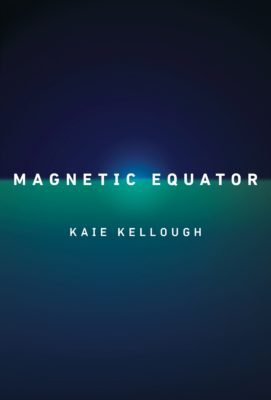
Magnetic Equator
Kaie Kellough
McClelland & Stewart
$19.95
paper
112pp
9780771043116
along the seam between worlds
she is my contextreturning after 30 years, and i am hers
at 39 visiting for the first time. my aunt saunters over& we three become a nation: black, mixed, indian
without a flag to waved, without an anthem, foreign attrition
His sense of place-making revels in detail while refraining from over-contextualization, allowing for a natural progression of the reader’s recognition. Surroundings can be hostile, they can be conflicted, they can contain safety or tragic histories in their fronds:
the roads constrict. a bicycle held
together by rust, grease, desire, balances. inches fly. the japanese car gears
up, down.
One of the most compelling leitmotifs in Magnetic Equator is that of the river. Whether it’s the Potaro flowing to the momentous Kaieteur Falls or the Bow serving as the “natural grammar” relief from the skyscrapers and suburbs of Calgary, rivers are powerful: they create constant movement while sustaining their own life cycles. Kellough’s search is a river that carries us from place to place with a current of self-assurance, and in his deconstructions of language, history, and identity, he creates a sweeping epic in Magnetic Equator that is stunning in its scope. (MH)
***
Nouveau Griot, the second collection from Antiguan-Canadian multidisciplinary artist Tanya Evanson, is a retrospective on twenty years of art that takes you full circle through the career of an exhilarating and underrated fixture in the Canadian poetry scene.
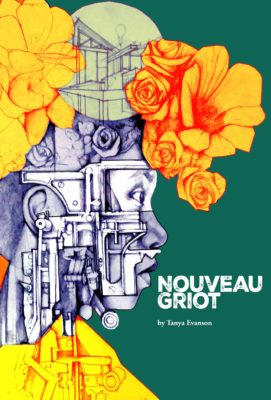
Nouveau Griot
Tanya Evanson
Frontenac House
$19.95
paper
80pp
9781927823842
Before Records or RAM, radio, radiation
We had slowness. A real root directory. We were tight with the world.
I find myself connecting her work to that of Zora Neale Hurston: another artist enmeshed in the world of folktales whose approach to rhythm and tone had a similar spring to its step.
More than observational, these works are experiential, multilingual explorations of the lives of other people, other cultures, other forms of thinking, and the ways in which we can learn from each other.
These poems exist at the macro level, considering issues from a broad, global perspective – in “Mundo Gumbo,” an entire life begins and eases itself joyfully towards death using the format of a recipe Evanson appears to know by heart. In a less expressive poet such forays could come off as condescending, but Evanson takes big risks with playfulness that almost always pay off:
Put the okra back in because Saturn be Returning to the place she was at
when you were born. This is called a cosmic bitch slap.
Even though Nouveau Griot is compiled from years of on-stage and in-studio work (Invisible World, The Memorists, Language for Gods, and Zenship), the way it coheres as a collection speaks to just how consistently Evanson has been “making human history personal” and opening readers’ eyes to a more globally-minded perspective of our current struggles. (MH)
***
While reading The Ritualites, Michael Nardone’s second collection of poetry, I found myself considering our society’s obsession with talking, and how much less interest it has in listening to what is being said. Nardone uses sound recording and transcription processes at loca- tions across North America as the basis for this collection, and the result is an exercise in radical empathy that shows how much we stand to gain by listening to each other:
We owe each other everything
I haven’t been talking much
But I’ve got stories
With its carefully tuned ear, The Ritualites takes public exchanges and interrogates them to find the intimacies within.
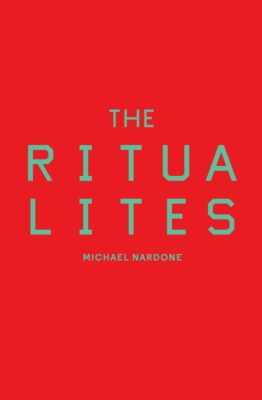
The Ritualites
Michael Nardone
Book*hug
$20.00
paper
94pp
9781771664554
Do you hear the thundering of wheels? Those are the train cars rolling on and on. Every minute of the day. Every day of the year. And you can hear the water gurgling—those are prisoners’ barges moving on and on. They are arresting someone all the time, cramming him in somewhere, moving him about.
Considering its often-aggressive subject matter and occasionally dense wordplay, The Ritualites is, at its core, superbly gentle. Nardone has taken the concept of the poetic ear and concretized it through his ambitious experiment in listening and documentation. The effect is a work of multifaceted complexity that rewards myriad interpretations. (MH)
***
The title and cover of poet Susan Gillis’s latest poetry collection, Yellow Crane, suggest nature. But a construction crane is visible through the tree branches, which points to the collection’s theme: that we are constructed of our choices and of what we choose to pay attention to. The author’s thoughts run long; the poem “Overture,” for example, is thirty-one pages, and time unfolds slowly in a seventeen-page poem about a construction crane. Gillis isn’t directing a plot-driven thriller.
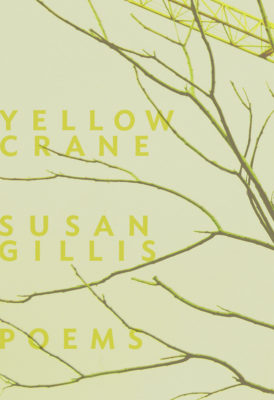
Yellow Crane
Susan Gillis
Brick Books
$20.00
paper
74pp
9781771314916
Tone varies like in an intimate conversation, such as when a friend shows off the sights of past lakeside campsites, “so close to the road I can just about read the tent labels.” There’s an irreverence for pastoral tone, and telling inner talk: “oh shut up, I say / and grip my duende’s hand a little tighter.” Consider the feeling of ache in “Fieldwork” as the narrator’s father dies:
I wish the plane that rebels shot down
could have hung on an updraftthe way a piece of field fluff holds on a current of air,
suspended as though in a web,not blown apart but held.
We go through life forgettinghow tender things can be.
Often, while reading, I had to stop to savour turns of phrase, feeling satisfied. The effect of the poems allows us to de-escalate our- selves until we can appreciate the subtlety of the weight of the word lemon versus the weight of the word thought. You are let in on the contemplations as they develop, and you can see the source water and other currents mixing at the mouth. (PP)
***
Behind the gorgeous cover of Harold Hoefle’s The Night Chorus is grim and gritty storytelling. Hoefle is gunning for unrelenting significance and finds the monumental late evening darkness of defeat at each heel. Poems in the collection won the Banff Centre Bliss Carman Poetry Award and the Great Blue Heron Poetry Contest.
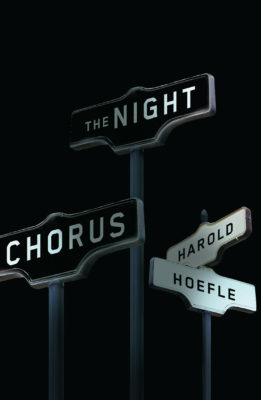
The Night Chorus
Harold Hoefle
McGill-Queen’s University Press
$16.95
paper
80pp
9780773554924
Conversational poems, such as “In the Name of the Father” and “Manning Up,” transcribe accounts of bravado. Spoiler: in the dramatic monologue of “In the Name of the Father,” the narrator offers to hunt down the driver who struck his acquaintance’s father. In “Manning Up,” a narrator recounts how Sally “womaned up” to shove her parents off a roof. The machismo in the derision for “a world ruined by soft hands” seems anachronistic to write, but this sort of tragedy tourism resonates with a depressive frame of mind.
The poems have a jaded view – a rope of schoolyard children are foreseen as aging into face-jobs and bad hookups. To use Hoefle’s own words: “We’re serious here, all furrowed fields and eyebrows.” To some this will be an intense, enjoyable read. (PP) mRb






0 Comments